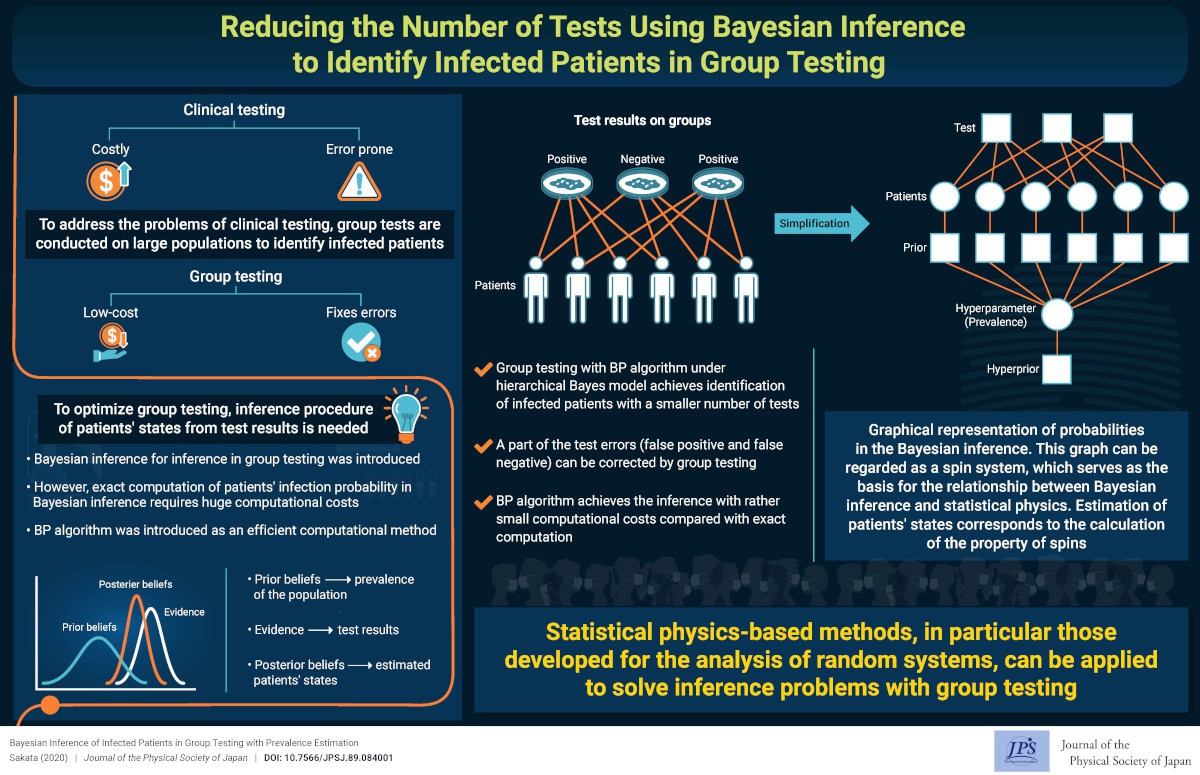Reducing the Number of Tests Using Bayesian Inference to Identify Infected Patients in Group Testing
© The Physical Society of Japan
This article is on
Bayesian Inference of Infected Patients in Group Testing with Prevalence Estimation
(JPSJ Editors' Choice)
J. Phys. Soc. Jpn.
89,
084001
(2020)
.
Group testing is a method of identifying infected patients by performing tests on a pool of specimens. Bayesian inference and a corresponding belief propagation (BP) algorithm are introduced to identify the infected patients in group testing.
Bayesian Inference of Infected Patients in Group Testing with Prevalence Estimation
(JPSJ Editors' Choice)
J. Phys. Soc. Jpn.
89,
084001
(2020)
.
Share this topic
Fields
Related Articles
-
Qualitative Changes in Kinetic Pathways Driven by Hydrodynamic Interactions in Dense Colloidal Suspensions
Cross-disciplinary physics and related areas of science and technology
Statistical physics and thermodynamics
Structure and mechanical and thermal properties in condensed matter
2025-4-18
Even in dense colloidal suspensions, where long-range hydrodynamic interactions are screened, near-field hydrodynamic interactions qualitatively influence the selection of kinetic pathways.
-
Overcoming Phase Transitions for Faster Quantum Annealing
Statistical physics and thermodynamics
2025-3-27
This study presents an innovative method to address the problem of phase transitions in quantum annealing, resulting in an exponential speedup of the process.
-
Exploring the Vibrant Interplay of Machine Learning and Physics
Cross-disciplinary physics and related areas of science and technology
Electron states in condensed matter
Elementary particles, fields, and strings
Mathematical methods, classical and quantum physics, relativity, gravitation, numerical simulation, computational modeling
Statistical physics and thermodynamics
Superconductivity
2025-3-13
This Journal of the Physical Society of Japan Special Topics edition explores how physics and machine learning complement each other and can solve unresolved problems in physics.
-
Hyperuniform and Multifractal States in Bosonic Quasicrystalline Systems
Statistical physics and thermodynamics
Structure and mechanical and thermal properties in condensed matter
2025-2-10
Quantum states can be categorized as hyperuniform or multifractal based on electronic characteristics. This study demonstrates that bosonic quasicrystalline systems exhibit hyperuniform or multifractal quantum states.
-
Exploring Materials without Data Exposure: A Bayesian Optimizer using Secure Computation
Cross-disciplinary physics and related areas of science and technology
Measurement, instrumentation, and techniques
2025-2-6
Secure computation allows the manipulation of material data without exposing them, thereby offering an alternative to traditional open/closed data management. We recently reported the development of an application that performs Bayesian optimization using secure computation.





